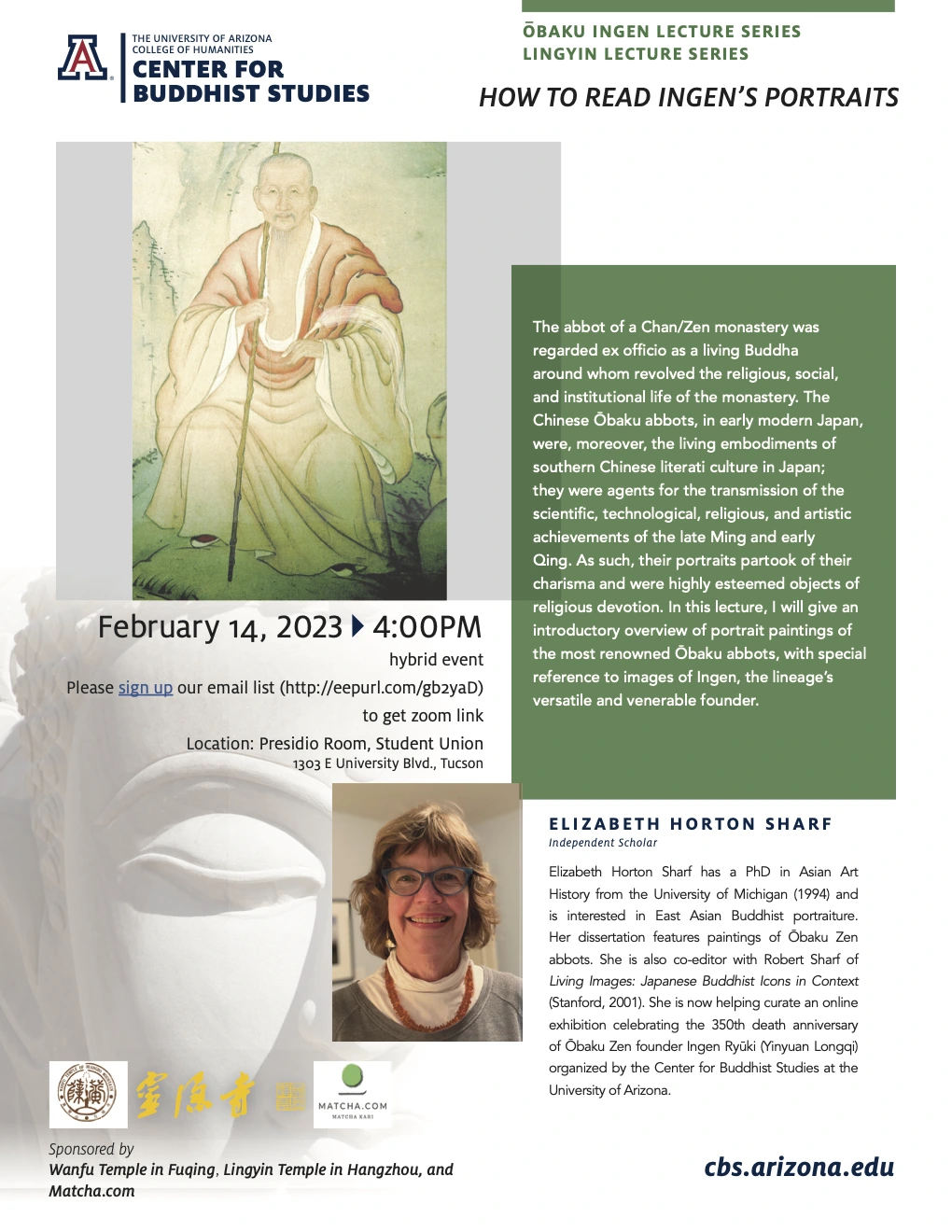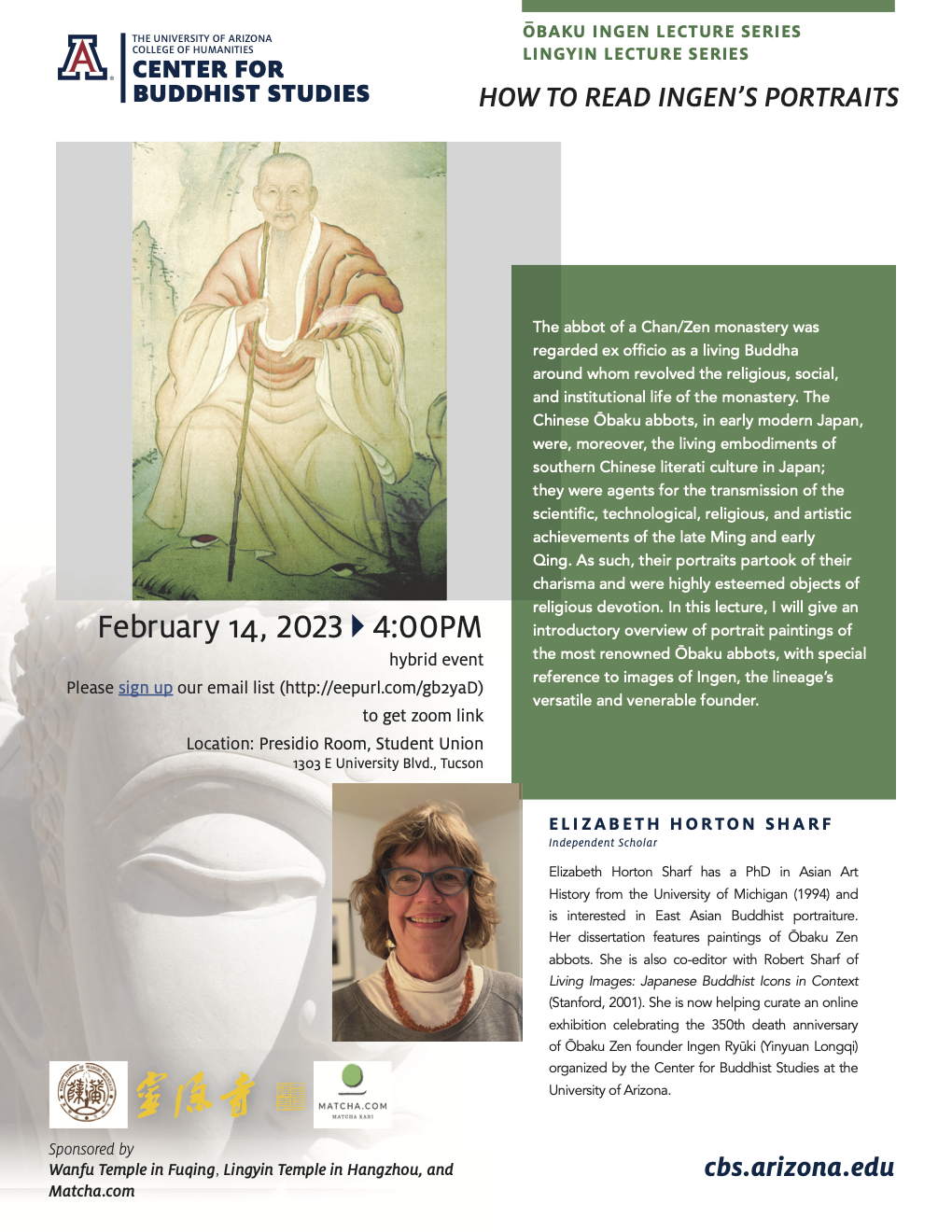
Dear Friends of the Center for Buddhist Studies,
Please join us on February 14th at 4 pm in Presidio Room, Student Union for the next lecture of Ōbaku Ingen/Lingyin Lecture Series of the term! This is a hybrid event (in-person/zoom).
To receive a link to the webinar, please sign up for our email list here: http://eepurl.com/gb2yaD. If you are already on our list and have updated your preferences by selecting "Lectures and Academic Research," you will receive the link soon.
The year 2022 marks the 350th death anniversary of Zen Master Yinyuan Longqi (隱元隆琦1592-1673, Ingen Ryūki in Japanese). Special ceremonies and events will be held in both Japan and China to honor this great Zen master. In North America, the Center for Buddhist Studies, College of Humanities at the University of Arizona is organizing a series of commemorative events which will run for one year beginning May 3, 2022. These events will present and explore the extraordinary life of Zen Master Yinyuan and the great achievements of the Huangbo 黃檗 Chan tradition (known as the Ōbaku school of Zen Buddhism in Japan) that Yinyuan pioneered in China and Japan. These events highlight the intersection between religion, art, and culture in China and Japan and will be presented in both online and offline formats. Activities will include an online exhibition of works of art related to the Ōbaku tradition, academic lectures, musical performances, and tea-related events. (Visit our Ōbaku Ingen website at: ingen.arizona.edu)
Talk title: “How to Read Ingen’s Portraits”
Speaker: Dr. Elizabeth Horton Sharf (Independent Scholar)
Time and Location:
Hybrid event
Time: 4:00-5:30 pm (Arizona Time)
Location: Presidio Room, Student Union
Address: 1303 E University Blvd, Tucson
Abstract:
The abbot of a Chan/Zen monastery was regarded ex officio as a living Buddha around whom revolved the religious, social, and institutional life of the monastery. The Chinese Ōbaku abbots, in early modern Japan, were, moreover, the living embodiments of southern Chinese literati culture in Japan; they were agents for the transmission of the scientific, technological, religious, and artistic achievements of the late Ming and early Qing. As such, their portraits partook of their charisma and were highly esteemed objects of religious devotion. In this lecture, I will give an introductory overview of portrait paintings of the most renowned Ōbaku abbots, with special reference to images of Ingen, the lineage’s versatile and venerable founder.
Speaker Bio:
Elizabeth Horton Sharf has a PhD in Asian Art History from the University of Michigan (1994) and is interested in East Asian Buddhist portraiture. Her dissertation features paintings of Ōbaku Zen abbots. She is also co-editor with Robert Sharf of Living Images: Japanese Buddhist Icons in Context (Stanford, 2001). She is now helping curate an online exhibition celebrating the 350th death anniversary of Ōbaku Zen founder Ingen Ryūki (Yinyuan Longqi) organized by the Center for Buddhist Studies at the University of Arizona.
These lecture series are made possible thanks to the generous support from Wanfu Temple in Fuqing, Lingyin Temple in Hangzhou, and Matcha.com.
Please follow us on social media to receive future updates:
Facebook: Center for Buddhist Studies
Instagram: @UACBS
Twitter: @UACBSofficial
Center's website: cbs.arizona.edu
We look forward to seeing you there!


